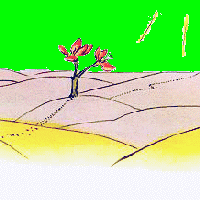XVIII
LA ETA princo trairis la dezerton kaj renkontis nur unu floron. Floron kun tri petaloj, tute neniom signifan.
"Bonan matenon!" diris la eta princo.
"Bonan tagon!" diris la floro.
"Kie estas homoj?" ĝentile demandis la eta princo.
La floro iam vidis pasi karavanon.
"Homoj? Ekzistas da ili ses aŭ sep, mi kredas. Mi ekvidis ilin antaŭ jaroj. Sed oni neniam scias, kie trovi ilin. Ventoj promenigas ilin. Mankas al ili radikoj; tio multe ĝenas ilin." "Adiaŭ!" diris la eta princo.
"Adiaŭ!" diris la floro.

